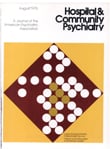Using Peer-Group Intervention With Problem Students in a Secondary School
Abstract
Twenty adolescent girls whose records showed poor academic performance and frequent truancies and ref errals to the guidance office were selected to participate in a pilot project to provide a peer-group experience for students having difficulty at school. Half the students were placed in a control group and received regular servicesfrom the school. Students in the experimental group attended 12 discussion sessions held during the school day. A one-year follow-up showed that seven in the experimental group and one in the control group had improved.
Access content
To read the fulltext, please use one of the options below to sign in or purchase access.- Personal login
- Institutional Login
- Sign in via OpenAthens
- Register for access
-
Please login/register if you wish to pair your device and check access availability.
Not a subscriber?
PsychiatryOnline subscription options offer access to the DSM-5 library, books, journals, CME, and patient resources. This all-in-one virtual library provides psychiatrists and mental health professionals with key resources for diagnosis, treatment, research, and professional development.
Need more help? PsychiatryOnline Customer Service may be reached by emailing [email protected] or by calling 800-368-5777 (in the U.S.) or 703-907-7322 (outside the U.S.).



